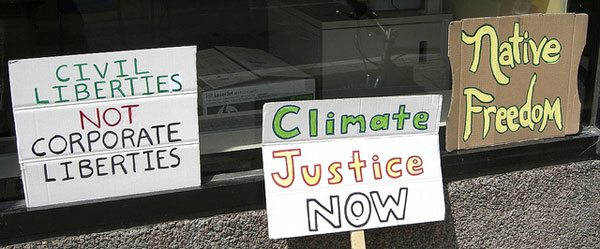
December 7, 2017; Colorlines
The Secwepemc Nation of British Columbia is ramping up its opposition to the expansion of the Trans Mountain pipeline, a project of Kinder Morgan Canada, which would bring tar sands oil from Alberta to the coast in British Columbia—from there to be shipped to customers in rapidly expanding Asian markets. The project would triple the pipeline’s capacity from 300,000 to 890,000 barrels of crude tar sands oil per day. Despite clear evidence that dependence on fossil fuels endangers the future of the planet, Big Oil continues its efforts to fully exploit the Alberta tar sands.
Indigenous peoples have been leading efforts to halt further expansion of the pipelines and to bring attention to the threat of climate change. The Secwepemc, for example, were inspired by the Standing Rock Sioux opposition to the Dakota Access pipeline, which will bring oil from Canada to the Gulf Coast. During 2016, the Sioux led efforts to stop the pipeline by building an encampment in its path. The Secwepemc are taking the encampment concept one step further, building tiny houses on wheels that can be strategically placed to block the Trans Mountain pipeline.
Kanahus Manuel, a Secwepemc arrested at Standing Rock in October 2016, told Colorlines, “We thought we’d only spend a few days at Standing Rock. Instead we were there for months.”
Now, Manuel leads the Tiny House Warriors Resistance camp in Victoria, the capital of British Columbia. Volunteers have built 10 tiny houses, each replete with “cooking facilities, bunk beds, and a wood-burning stove,” according to Colorlines. The tiny houses are solar-powered and use composting toilets.
The tiny houses are more than a convenient tool for blocking the pipeline; they are also homes, intended to begin to address the Secwepemc Nation’s dire need for housing. Says Manuel, “We need to be able to provide for our nation, and this is something that’s not only a way to resist, but a creative solution for us to solve our own problems.”
Sign up for our free newsletters
Subscribe to NPQ's newsletters to have our top stories delivered directly to your inbox.
By signing up, you agree to our privacy policy and terms of use, and to receive messages from NPQ and our partners.
The displacement of the Secwepemc is of grave concern to Manuel, who says that 62 percent of the indigenous people in the area no longer live on the reserve. Preserving cultural values among city dwellers struggling to pay rent and survive is an ongoing challenge.
“We have a right to self-determination, and that includes being able to build our own homes on our land,” says Manuel. She envisions multiple tiny house villages “with small scale farming and language revitalization programs.” With the tiny houses, says Manuel, “there’s hope that we are going to lift ourselves out of oppression and economic poverty.”
That hope in part depends on the success of indigenous nations in gaining control over their lands. In the case of the Trans Mountain pipeline, Canadian Prime Minister Justin Trudeau approved the pipeline without the consent of the Secwepemc Nation. The Tseleil-Waututh Nation, located on the coast of British Columbia, is also protesting the pipeline because of its impact on their traditional resources. According to NPR, they have joined with other First Nations in a lawsuit that asserts that First Nations were not properly consulted about the pipeline.
“The pipeline expansion terminates right—I don’t say in our backyard, I say in our kitchen,” Charlene Aleck, an elected councilor of the Tseleil-Waututh, told NPR. Noting that increased tanker traffic is a threat to her people, Tseleil-Waututh continued, “It’s not if a spill happens, it’s when it happens.”
Melina Laboucan-Massimo, who is Lubicon Cree, saw the lands of her people near the Alberta tar sands severely polluted by toxic chemicals that are used in the fracking process. She is volunteering on the tiny house project because it is both a form of resistance and a solution to the climate crisis. The tiny house movement is growing around the world as part of the move toward sustainable living.
Laboucan-Massimo explained to Colorlines that climate change is a threat none can afford to ignore: “We’re at a point in history where we need to transition from our dependency on fossil fuels and transition to renewable energy and real tangible climate solutions. Instead of talking about what the solutions are, this project is actually implementing them.”—Karen Kahn












